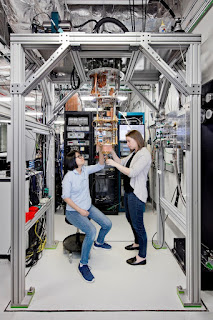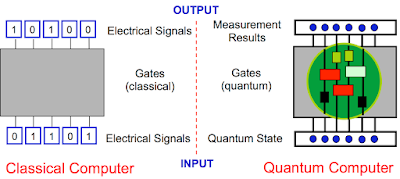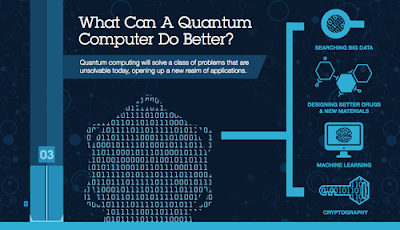Twitter Feed
NJVC to Spotlight Cloudcuity at Gartner Data Center Conference
Las Vegas., Nov. 15, 2012 — NJVC, an information technology solutions provider headquartered in Northern Virginia, announces it will spotlight its Cloudcuity™ framework for delivering secure and unified cloud management…
NJVC Cloud Expert Kevin L. Jackson Launches Second Book: GovCloud II: Implementation and Cloud Brokerage Services
VIENNA, Va., Nov. 8, 2012—NJVC, an information technology (IT) solutions provider headquartered in northern Virginia, is pleased to announce that Kevin L. Jackson, vice president and general manager, cloud services,…
Virtustream a Visionary in Gartner 2012 IaaS Magic Quadrant
Congratulations to NJVC Cloudcuity partner Virtustream for being positioned as a visionary in the Gartner 2012 IaaS Magic Quadrant! Magic Quadrants provide a graphical competitive positioning of four types of…
GovCloud II: Implementation and Cloud Brokerage Services Now Available
I’m happy and proud to announce the release of my second book, “GovCloud II: Implementation and Cloud Brokerage Services” by my publisher Government Training Inc. The public and private…
NJVC® Introduces Cloudcuity™ AppDeployer to Create and Sell Software Applications
Developers Can Create, Deploy and Publish Apps in the Cloud for Free Vienna, Va., Oct. 18, 2012 — NJVC®, an information technology (IT) solutions provider headquartered in Northern Virginia, introduces…
NJVC® Announces the Cloudcuity™ Government Marketplace, Powered by Virtustream’s Secure Cloud xChange
Vienna, Va., Oct. 4, 2012—NJVC®, an information technology solutions provider headquartered in Northern Virginia, and Virtustream, Inc., a leading enterprise cloud software company, today announced a new alliance to provide…
Cloudcuity™: Thought Leadership Translated to Operational Excellence
As my long time readers have certainly noticed, the frequency of my posts have lengthened over the past few months. First, I would like to offer my apologies for being…
NJVC® Unveils Cloudcuity™ Umbrella Framework for NJVC Cloud Services
Vienna, Va., Sept. 13, 2012 — NJVC®, an information technology (IT) solutions provider headquartered in Northern Virginia, introduces Cloudcuity™, a new framework for the company’s cloud service offerings to help…
NJVC® Announces SaaS Accelerate: Specialized Infrastructure Hosting and Managed Services Program for Software-as-a-Service Providers
VIENNA, Va., Aug. 15, 2012 —NJVC® announces the release of NJVC SaaS Accelerate, a specialized infrastructure hosting and managed services offering designed to support the business needs of software-as-a-service (SaaS)…
Texas Cloud Computing Lessons Learned
Late last week the Texas Department of Information Resources (DIR) released an important whitepaper that reviewed it’s multi-year Pilot Texas Cloud Offering (PTCO). This project was designed to allow a…
- The release of a new API (Application Program Interface) for the IBM Quantum Experience that enables developers and programmers to begin building interfaces between its existing five quantum bit (qubit) cloud-based quantum computer and classical computers, without needing a deep background in quantum physics.
- The release of an upgraded simulator on the IBM Quantum Experience that can model circuits with up to 20 qubits. In the first half of 2017, IBM plans to release a full SDK (Software Development Kit) on the IBM Quantum Experience for users to build simple quantum applications and software programs.
The IBM Quantum Experience enables anyone to connect to IBM’s quantum processor via the IBM Cloud, to run algorithms and experiments, work with the individual quantum bits, and explore tutorials and simulations around what might be possible with quantum computing. Since its launch less than a year ago, about 40,000 users have run over 275,000 experiments on the IBM Quantum Experience. It has become an enablement tool for scientists in over 100 countries and, to date, 15 third-party research papers have been posted to arXiv with five published in leading journals based on experiments run on the Quantum Experience.
 The broad availability of quantum computing capability could prove to be a significant blow to current data encryption practices. In 2015 the US National Security Agency actually advised US agencies and businesses to prepare for a time when the cryptography protecting virtually all e-mail, medical and financial records, and online transactions would be rendered obsolete by quantum computing. The US National Institute for Standards and Technology (NIST) is also running a competition to spur work on post-quantum algorithms.
The broad availability of quantum computing capability could prove to be a significant blow to current data encryption practices. In 2015 the US National Security Agency actually advised US agencies and businesses to prepare for a time when the cryptography protecting virtually all e-mail, medical and financial records, and online transactions would be rendered obsolete by quantum computing. The US National Institute for Standards and Technology (NIST) is also running a competition to spur work on post-quantum algorithms. - Drug and Materials Discovery: Untangling the complexity of molecular and chemical interactions leading to the discovery of new medicines and materials;
- Supply Chain & Logistics: Finding the optimal path across global systems of systems for ultra-efficient logistics and supply chains, such as optimizing fleet operations for deliveries during the holiday season;
- Financial Services: Finding new ways to model financial data and isolating key global risk factors to make better investments;
- Artificial Intelligence: Making facets of artificial intelligence such as machine learning much more powerful when data sets can be too big such as searching images or video; or
- Cloud Security: Making cloud computing more secure by using the laws of quantum physics to enhance private data safety.
This content is being syndicated through multiple channels. The opinions expressed are solely those of the author and do not represent the views of GovCloud Network, GovCloud Network Partners or any other corporation or organization.
( Thank you. If you enjoyed this article, get free updates by email or RSS – © Copyright Kevin L. Jackson 2017)
Cloud Computing
- CPUcoin Expands CPU/GPU Power Sharing with Cudo Ventures Enterprise Network Partnership
- CPUcoin Expands CPU/GPU Power Sharing with Cudo Ventures Enterprise Network Partnership
- Route1 Announces Q2 2019 Financial Results
- CPUcoin Expands CPU/GPU Power Sharing with Cudo Ventures Enterprise Network Partnership
- ChannelAdvisor to Present at the D.A. Davidson 18th Annual Technology Conference
Cybersecurity
- Route1 Announces Q2 2019 Financial Results
- FIRST US BANCSHARES, INC. DECLARES CASH DIVIDEND
- Business Continuity Management Planning Solution Market is Expected to Grow ~ US$ 1.6 Bn by the end of 2029 - PMR
- Atos delivers Quantum-Learning-as-a-Service to Xofia to enable artificial intelligence solutions
- New Ares IoT Botnet discovered on Android OS based Set-Top Boxes




